

The Future of Corporate Learning: Stepping Into Another Dimension. With new advances in artificial intelligence (AI), augmented reality (AR), virtual reality (VR) and machine learning, technology is transforming the training industry at an accelerated pace.
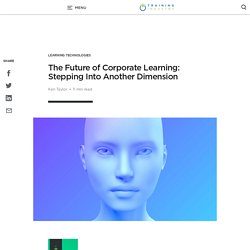
It’s easy to get caught up in the hype of new technology without fully understanding the benefits and drawbacks. Education needs to take place for both instructional designers and learning leaders to understand the economics involved and the potential value for learners and the business. Leveraging technology in the right way can help improve employee performance. We know that the power of doing has a huge impact on skill development, and these new technologies can support that power. The technologies allow us to move beyond basic skill development to employee performance improvement. Upskilling and reskilling: Remain relevant and employable. Aworkforce research report has found that only 23.8% of working South Africans believe their current skills will keep them employed in 10 years’ time.
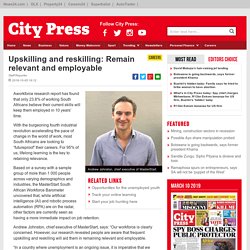
With the burgeoning fourth industrial revolution accelerating the pace of change in the world of work, most South Africans are looking to “futureproof” their careers. For 95% of us, lifelong learning is the key to retaining relevance. Based on a survey with a sample group of more than 1 000 people across varying demographics and industries, the MasterStart South African Workforce Barometer uncovered that, while artificial intelligence (AI) and robotic process automation (RPA) are on the radar, other factors are currently seen as having a more immediate impact on job retention.
Andrew Johnston, chief executive of MasterStart, says: “Our workforce is clearly concerned. However, our research revealed people are aware that frequent upskilling and reskilling will aid them in remaining relevant and employable. It’s tough out there . . . . The Future of Work in South Africa: What’s Changing and What Skills You’ll Need - The WorkSpace.
That doesn’t mean people in other professions can relax.

AI systems are getting better by the day at all kinds of complex tasks, from making financial trades to reading medical scans, flying planes and responding to customers. How work is changing Several major shifts are already well underway, in South Africa and elsewhere. More short-term work Increasingly, full-time employment is being replaced by short-term contracts – the so-called “gig economy”. At the same time, employers are making increased use of independent contractors and virtual, geographically dispersed teams.
A move away from traditional office spaces Many more people are working from home. 42% of South African organisations have employees working from home on a full-time basis67% predict they’ll have employees working from home full-time within the next two years. WORLD ECONOMIC FORUM REPORT: THE FUTURE OF JOBS AND SKILLS IN AFRICA – Cape Digital Foundation. Preparing the Region for the Fourth Industrial Revolution Trends in the shift to an information society and the impact of global digitisation demonstrate that competitive service delivery within the confines of an outdated structure renders it impossible for business, education, government or nation states to operate in the national best interest.
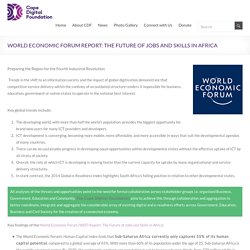
Key global trends include: Africa’s young people are much more likely to have passed through the continent’s formal education systems than their predecessors.
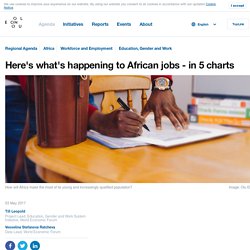
With that comes a challenge for leaders of business and government to provide them with the opportunities to apply their skills. More than that, to ensure their skills can help them thrive in the changing world of work. A new report by the World Economic Forum has uncovered 5 key facts about the future of jobs and skills in the region 1. Africa’s young people are better educated At current rates, 15 to 20 million increasingly well-educated young people are expected to join the continent’s workforce every year until 2030. 2) Africa could make more of its human capital Africa’s demographic dividend creates a huge opportunity.
Image: World Economic Forum’s Human Capital Index. College News At a recent Queensland Curriculum Assessment and Authority conference for school principals, we were briefed about the planned change of senior schooling from the current Overall Position (OP) system to the Australian Tertiary Admission Ranking (ATAR).
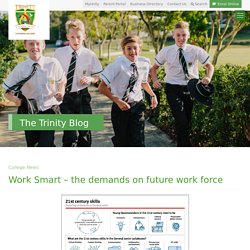
This will affect our current Year 9 and younger students. Furthermore, the new system emphasised the importance of developing the 21st century learning and work skills such as collaboration, communication, problem-solving, personal attributes and entrepreneurial skills. This future forecast echoed the report Thriving in the New Work Order 2017 published by The Foundation of Young Australians (FYA). The report stated that, due to the increasing rate of automation, globalisation and flexibility, by 2030 workers, i.e. our students will need to develop work smart skills. References can be accessed via these website: Head, B. To provide you with information for your future reference, you can download this post as a PDF here. The gap between the skills people learn and the skills people need is becoming more obvious, as traditional learning falls short of equipping students with the knowledge they need to thrive, according to the World Economic Forum report New Vision for Education: Fostering Social and Emotional Learning Through Technology.

Today's job candidates must be able to collaborate, communicate and solve problems – skills developed mainly through social and emotional learning (SEL). Combined with traditional skills, this social and emotional proficiency will equip students to succeed in the evolving digital economy. What skills will be needed most? An analysis of 213 studies showed that students who received SEL instruction had achievement scores that averaged 11 percentile points higher than those who did not. And SEL potentially leads to long-term benefits such as higher rates of employment and educational fulfillment.
The Future of Jobs. The Fourth Industrial Revolution: what it means and how to respond. We stand on the brink of a technological revolution that will fundamentally alter the way we live, work, and relate to one another.
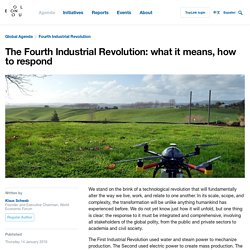
In its scale, scope, and complexity, the transformation will be unlike anything humankind has experienced before. The 10 skills you need to thrive in the Fourth Industrial Revolution. Five years from now, over one-third of skills (35%) that are considered important in today’s workforce will have changed.
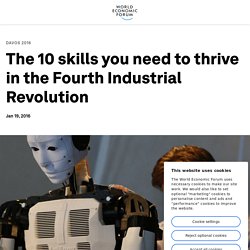
By 2020, the Fourth Industrial Revolution will have brought us advanced robotics and autonomous transport, artificial intelligence and machine learning, advanced materials, biotechnology and genomics. These developments will transform the way we live, and the way we work. Some jobs will disappear, others will grow and jobs that don’t even exist today will become commonplace. Future Work Skills 2020. Can 'soft skills' save your job from the robots? Your best comments on the future of work.